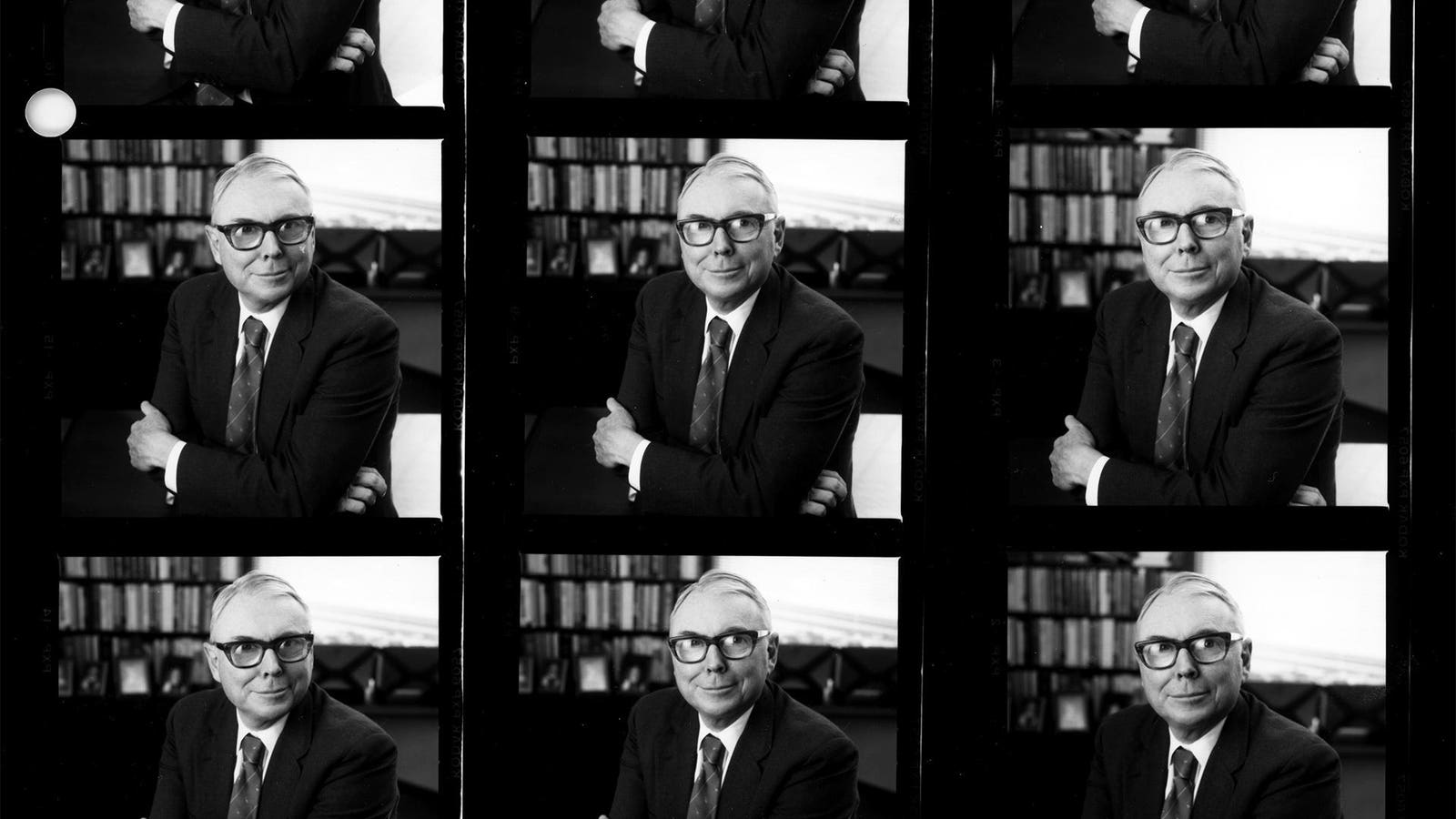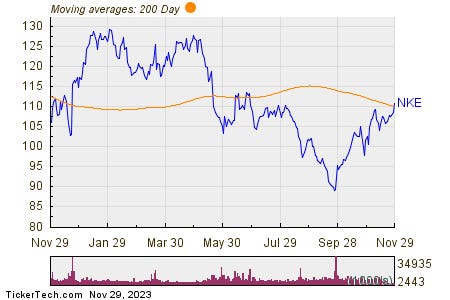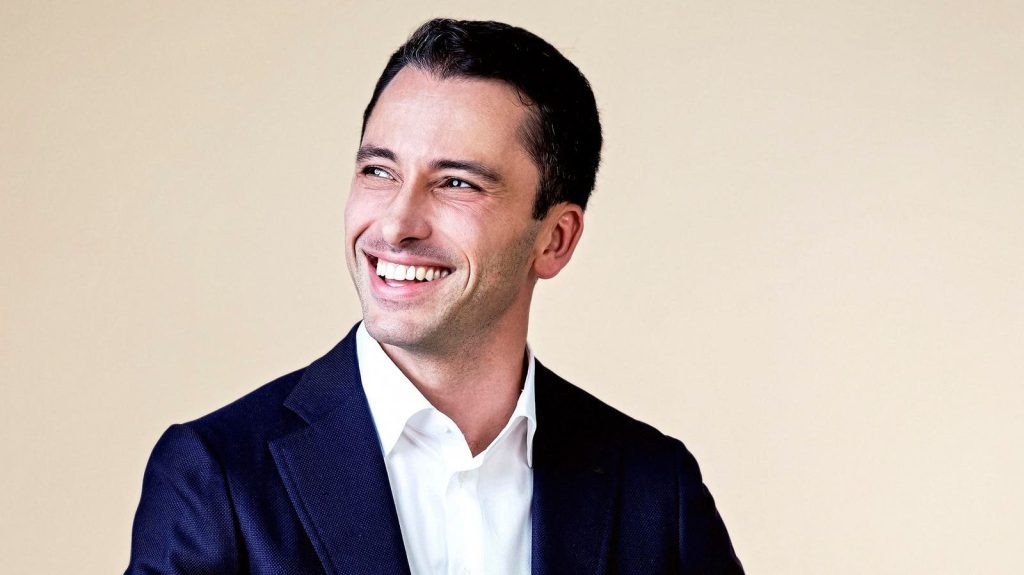Berkshire Hathaway’s longtime vice chairman, Charles Munger, passed away yesterday at age 99. This Forbes cover story from early 1996, reveals just how transformational this sidekick was for Warren Buffett.
By Matt Schifrin, Forbes Staff
Nearly 28 years ago in the January 22, 1996 edition of Forbes Magazine we published the first major profile on Warren Buffett’s consigliere, “The Not-So-Silent Partner.”
I urge you to read this excellent vintage Forbes cover story. You will learn that without Munger’s counsel, 93-year old Warren Buffett would have likely never become the GOAT among global investors or amassed a net worth of $120 billion. In Buffett’s early days he was a strict Graham & Dodd value investor, buying cheap stocks at “give-away prices” and selling them when they were no longer cheap. Munger converted Buffett’s guiding investment philosophy into what we describe in our story as “one decision growth stocks” with the intention of buying and holding forever. This is exactly what Berkshire has done with stock such as Coca-Cola and American Express, and private companies like See’s Candy and GEICO.
Using this strategy Berkshire became unshackled from the restrictions of deep discount Benjamin Graham value investing. While rigorous analysis was still employed, Berkshire began buying “fully valued” stocks that had nearly invincible franchises, like Apple, whose growing stream of earnings and dividends ultimately became compound interest machines.
The other major Berkshire strategy heavily influenced by Munger, and first detailed in this cover story, is the idea of playing the odds by using the “float” from the premiums of the insurance companies it owns, like GEICO and National Indemnity, to greatly magnify portfolio returns.
By Robert Lenzner and David S. Fondiller
The Not-So-Silent Partner
Meet Charlie Munger, the Los Angeles lawyer who converted Warren Buffett from an old- fashioned Graham value investor to the ultimate buy-and-hold value strategist.
WARREN BUFFETT, probably the greatest investor in modern American history, did not do it alone. He never claimed he did, but so overwhelming has his public presence become that few people realize that for more than 30 years Buffett has had a not-so-silent partner who is as much the creator of the Berkshire Hathaway investment philosophy as is the master himself.
Charles Munger is a 72-year-old lawyer and investor, a curmudgeon who lives in Los Angeles, 1,300 miles and a two-hour time difference from Buffett’s headquarters in Omaha, Neb. Munger and Buffett complement each other beautifully. Munger comes on more arrogant and erudite, while Buffett comes on modest and folksy. But that’s the surface in both cases. Underneath, these are two minds in almost uncanny sync.
“I probably haven’t talked to anyone on Wall Street one hundredth of the times I speak to Charlie,” says Buffett. Charlie Munger is the quintessential realist against whom Buffett tests his ideas. “Charlie has the best 30-second mind in the world. He goes from A to Z in one move. He sees the essence of everything before you even finish the sentence.” In 1978 Munger was named vice chairman of Berkshire Hathaway and in 1983 chairman of Wesco Financial Corp., a finance company that’s 80% controlled by Berkshire. He is also a director of Salomon Inc.
To understand Munger’s influence on Buffett you have to recall the gradual evolution of the latter’s investment philosophy. The Omaha phenomenon began as pure Ben Graham—buy cheap stocks at giveaway prices if possible and sell them when they are no longer cheap. You figure out when they are cheap by careful balance sheet analysis. Buffett still follows the Graham precepts of careful analysis, but it’s been years since Buffett has bought stocks that, by Graham’s standards, are cheap in terms of assets, earnings or cash flow. Nor does he, in classic Graham style, look to sell holdings when they catch up with the market.
Over the years, especially in the 1980s and 1990s, Buffett has moved closer to the concept of one-decision growth stocks—buy ’em and hold ’em forever, or at least until their fundamentals deteriorate.
Coca-Cola wasn’t cheap by conventional standards when Berkshire Hathaway first bought it in 1988. On The Street it was regarded as an excellent but fully valued stock. Coca-Cola has since appreciated by close to 600%, or a compound annual rate of return of some 25%, but Berkshire has taken not a penny in profits and has sold not a single share.
What distinguishes Buffett and Munger from the herd that went to its doom in 1974 with the Nifty 50 one-decision growth stocks is this: In true Ben Graham fashion Buffett and Munger do their homework. Berkshire Hathaway’s one-decision picks—Coca-Cola, Washington Post Co., Geico, Gillette, Wells Fargo, Buffalo News and Dexter Shoes—were chosen only after exhaustive analysis of balance sheets and of social and economic trends. Where most analysts saw only good but fully valued properties, Buffett saw franchises that were priceless, virtually immune from inflation and capable of continued growth—compound interest machines, in short. None of the flashes in the pan here like Avon Products or Xerox that passed as buy-and-hold-forever stocks 20 years back.
In that gradual synthesis of Graham and one-decision theory, Charlie Munger played the creative role. Buffett says: “Charlie shoved me in the direction of not just buying bargains, as Ben Graham had taught me. This was the real impact he had on me. It took a powerful force to move me on from Graham’s limiting views. It was the power of Charlie’s mind. He expanded my horizons.”
As if completing Buffett’s thought—though in a separate interview—Munger explains further: “We realized that some company that was selling at two or three times book value could still be a hell of a bargain because of momentums implicit in its position, sometimes combined with an unusual managerial skill plainly present in some individual or other, or some system or other.” Coca-Cola fits that pattern. So do See’s Candies and the Washington Post Co. Munger says: “We intend to hold Coca-Cola forever.” Forever? That’s a word not to be found in Ben Graham’s investment lexicon.
Conventional wisdom says that no one ever went broke taking profits. Munger doesn’t think that way. “There are huge advantages for an individual to get into a position where you make a few great investments and just sit back. You’re paying less to brokers. You’re listening to less nonsense.” Best of all, Munger says, you don’t have to pay off the tax collector every year. “If it works, the governmental tax system gives you an extra one, two or three percentage points per annum with compound effects.” Munger is referring to what most investors know in theory but ignore in practice: that the so-called capital gains tax is no capital gains tax at all. It is a transaction tax. No transaction, no tax. Since profit-taking involves transactions it obliges you to take the IRS in as a partner. With profits not taken, there remains a theoretical tax liability, but the the money is still working for you.
Besides, if you sell stock in a great company, where can you find a comparable investment? As the poet Omar Khay-yam put it: “Oft I wonder what the vintner buys half so precious as the stuff he sells.”
Buffett and Munger share a deep respect for the awesome, mysterious power of compound interest. Charlie Munger loves to quote his hero, Benjamin Franklin, on the subject. Wrote Franklin of compounding: “. . . ’tis the stone that will turn all your lead into gold. . . . Remember that money is of a prolific generating nature. Money can beget money, and its offspring can beget more.”
Munger is rarely without a compound rate of return table. He illustrates its magic by taking an investment of $1 and demonstrating that a return of 13.4% a year, after taxes, over 30 years, will make that $1 worth $43.50. To Munger it’s much better to depend on compounding than on market timing.
What few people realize is that Buffett and Munger wring extra power from the compounding principle through use of leverage. Take that $1 compounded for 30 years at 13.4%. Suppose in the first year you borrow 50 cents at 8% and invest that, too. The net effect is to raise your rate of return from 13.4% to 18.8%. Repeat that process every year, and over the full 30 years your $1 will beget its way to $176.
“Understanding both the power of compound return and the difficulty getting it is the heart and soul of understanding a lot of things,” says Munger in typically grandiose terms.
Munger persuaded Buffett to buy 100% of See’s Candies for Berkshire in 1972 for $25 million, net of surplus cash. This was no Ben Graham stock. But it has turned out to be a compound interest machine. Last year See’s made about $50 million pretax, putting a value on the company of $500 million. That’s a 13.3% compounded rate of return for 24 years. Add in pretax retained earnings over this period—which were reinvested—and you get a total pre-tax return of over 23% annually.
At any time in these 24 years Berkshire Hathaway could have cashed in all or part of See’s through an initial public offering. Why didn’t it? Answers Munger: “The number of acquisitions making 23% pretax is very small in America.” Better to leave the money compounding in a relatively sure thing.
In Roger Lowenstein’s insightful and highly readable biography, Buffett: The Making of an American Capitalist, Munger gets relatively few pages of his own. Yet Buffett would be the first to admit that without Charlie Munger he probably would not have become one of the richest men in the world.
Lowenstein doesn’t ignore Munger’s role but, perhaps because it is less dramatic than Buffett’s, he underplays it. Once a year Warren and Charlie sit side-by-side on the stage of an auditorium in Omaha on the day of the Berkshire Hathaway annual meeting. They often meet in New York and California, and recently spent the weekend in Seattle with Buffett’s close pal, Microsoft’s Bill Gates. But for most of the year they are connected only by the telephone wires.
In the exchanges carried over those wires, Buffett is the stock picker while Munger is the doubter, the skeptic, the devil’s advocate, against whom Buffett tests his ideas. The simple tact is that you can’t tell whether an idea is likely to work unless you consider all the possible negatives. Not that Munger is a sour puss. Their verbal exchanges are larded with jokes. For all their surface differences, these two men have similar minds. “Everybody engaged in complicated work needs colleagues,” explains Munger. “Just the discipline of having to put your thoughts in order with somebody else is a very useful thing.”
“You know this cliché that opposites attract? Well, opposites don’t attract. Psychological experiments prove that it’s people who are alike that are attracted to each other. Our minds work in very much the same way.”
Where and how do their minds work together? “On the close calls,” Munger replies. Okay, it’s a good company. But is the price low enough? Is the management made up of people Munger and Buffett are comfortable with? If it is cheap enough to buy, is it cheap for the wrong reason or the right reason? As Munger puts it: “What’s the flip side, what can go wrong that I haven’t seen?”
Right now the two men arc matching wits about Berkshire Hathaway’s 20 million shares, or 13% stake, in Capital Cities/ABC, worth $2.5 billion. By early this year, when shareholders vote on the takeover of Capital Cities by Walt Disney Co., Munger and Buffett will have to decide whether they want to become one of the two largest shareholders in what would be the biggest entertainment concern in the nation.
Should they go for all Walt Disney stock in the deal? Or compromise by choosing half stock and half cash? Maybe with the Dow over 5000, they should cash in all their chips.
Don’t be surprised if Buffett and Munger go for a good-sized chunk of cash. “We have huge admiration for what Disney has achieved. But the stock is very high, and the market itself is near record levels,” Munger tells Forbes. Disney is selling at 22 times earnings and 5 times book value. It’s good but is it that good? Munger and Buffett are keeping the wires burning talking about it.
In a tie vote, Munger says, Buffett wins. After they have kicked around a subject, he is willing to let Buffett make the final decision. “A lot of dominant personalities, like me, can never play the subservient role even to Warren, who is more able and dedicated than I am,” Munger says.
That last sentence explains a lot about both men. Munger is immensely opinionated. Yet he is willing to play second fiddle. To subordinate strong views and a powerful personality requires a high degree of self-discipline and objectivity. Objectivity is the key word here. It means stripping decisions of emotions, of hopes and fears, of impatience and self-delusion and all purely subjective elements. Few people have this strength. Munger does. Giving in sometimes to Buffett requires, in Munger’s own words, “objectivity about where you rank in the scheme of things.”
Another word for objectivity is “cold-blooded.” Most of us mere humans get dizzy when a stock we hold goes up and up. Acrophobia sets in. We fear losing our paper profits. So we sell and sometimes we are sorry. At the other extreme, we like an investment but shy away because the consensus says we are wrong. Munger and Buffett strive to strip out emotion. Likewise, when things start to go wrong, most of us keep hoping they will soon get better. Munger and Buffett try not to hope but to coldly analyze the possibilities. This hard-nosed objectivity had a recent demonstration in the joint decision to redeem $140 million worth of preferred shares in troubled Salomon Inc. rather than convert them into common shares. Emotionally Buffett and Munger had a lot tied up in Salomon. Objectively, they could find better places to put the money. Salomon just had to go.
Munger backed up Buffett on one of the most cold-blooded decisions at Salomon: to refuse to pay all of the deferred and vested compensation former chairman John Gutfreund claimed he was owed. Contrast this with the rich payoffs recently given to ousted executives at Time Warner. In Munger’s view, Gutfreund let the company down and deserved no huge golden handshake.
Gutfreund is bitter toward Munger. For the sake of keeping the peace most executives would have paid Gutfreund off. But in Munger’s view that would not be an objective decision.
More often than they disagree, Munger and Buffett see things exactly alike. It took them only about three hours to decide about accumulating a 4% position in the Federal Home Loan Mortgage Corp. for Berkshire Hathaway in 1989. That position, for which Berkshire paid only $72 million, is today worth over half a billion dollars.
It was a no-brainer, says Munger. “Only savings and loans could own it. And no- body could own more than 4%. Here was the perfect inefficient market. You’ve got something that makes hundreds of millions of dollars. It was obvious.”
For Buffett and Munger maybe. But not for everyone.
Buffett is by far the wealthier of the two. Buffett—who got there first—with his wife owns 43.8% of Berkshire Hathaway, worth $17 billion. Munger’s 1.6% is currently worth $610 million.
Where Buffett says he can’t remember ever selling a share of Berkshire stock, Munger has given away several hundred shares as charitable gifts. He has given heaps of money to Los Angeles’ Good Samaritan Hospital. He has contributed liberally to Planned Parenthood and the Stanford University Law School, and was the major donor of a new science center at the Harvard-Westlake School, a private day school in Los Angeles.
It’s not a question of relative greed: Buffett does not live an especially lavish life and plans on leaving almost everything to his wife, Susan, who in turn has promised to leave it to the best endowed foundation in the world. It’s as if the two men, on this point, have different time spans: Munger wants the satisfaction of seeing his money do good things now; Buffett sees his role as piling up more chips for his heirs to do good things with.
Apparently Buffett figures that the longer he has to work his compound interest magic, the more money his heirs will have to do good with. While a lot of people criticize Buffett for not being more generous, Munger stoutly defends his friend: “It’s more useful for Warren to be piling it up than to be giving it away.” It was Munger, not Buffett, who initiated the designated contributions plan under which Berkshire shareholders get to donate $13 for each of their shares to their favorite charity.
One thing on which Munger and Buffett do not exactly agree is politics. Munger who, with his second wife Nancy, has eight children, is a registered Republican. Buffett is a Democrat who has enjoyed rubbing elbows with the Clintons. “I’m more conservative but I’m not a typical Colonel Blimp,” says Munger.
While he has less passion than Buffett for civil rights, Munger does agree with Buffett on population control and abortion rights. During the 1960s Munger helped California women obtain abortions in Mexico by paying for their trips. Later, he was a driving force in helping persuade the California Supreme Court to make the first decision overturning, on constitutional grounds, a law prohibiting abortions. Recalls Buffett: “Charlie took over the case. He solicited the deans of leading medical and law schools to enter amicus briefs. Charlie did all the work on it night and day, even writing some of the briefs himself.”
There must be something in the air or the water in Omaha. Though the pair met only in the late 1950s, the house Munger grew up in is only 200 yards from Buffett’s current home. As a young man Munger also worked in Buffett’s grandfather’s grocery store. After attending the University of Michigan and the California Institute of Technology without getting a degree, Munger served as meteorological officer in the Air Force in World War II. He gained entrance to Harvard Law School without an undergraduate degree, and graduated in 1948. He was only 22 when he entered Harvard, but even by the standards of that arrogant institution Munger was noted as a brainy but somewhat pompous and conceited fellow. Unprepared for a lesson one day, he calmly told his professor, “Give me the tacts and I’ll give you the law.”
Unlike Buffett, Munger has never devoted full time to investing. After graduation he shunned his home town, plying for the richer prospects in Los Angeles where he joined Musick Peeler & Garrett, the law firm which represented wealthy local entrepreneurs including J. Paul Getty.
Later, Munger formed his own firm, Munger, Tolles & Olson, which still carries his name first. It is one of the leading California firms, representing Southern California Edison and Unocal, as well as Berkshire Hathaway. In 1965 he stepped down as an active partner of the firm, though he keeps his office there and still lectures the partners on the importance of choosing clients like friends, and not going for the last dollar.
Munger began his investment career independent of Buffett. From 1962 until 1975 he managed Wheeler Munger & Co., an investment counseling firm, from a grungy office in the Pacific Coast Stock Exchange building. Munger’s investment record did not match Buffett’s in those years, but he earned a highly respectable compound return of 19.8% a year before fees and after expenses.
Munger did not become a large Berkshire Hathaway shareholder until the late 1970s when two of his holdings. Diversified Retailing, and later Blue Chip Stamps, were merged into Berkshire. After that, Buffett and Munger got to know each other better—and Buffett moved into his most productive period.
The two live very different lives. Of late Buffett has begun to enjoy his popularity, while not neglecting his investing. Munger, as always, pursues a wide range of activities. “I’ve tried to imitate, in a poor way, the life of Benjamin Franklin. When he was 42, Franklin quit business to focus more on being a writer, statesman, philanthropist, inventor and scientist. That’s why I have diverted my interest away from business.”
Remarkably, neither Munger nor Buffett has much regard for Wall Street, though it has made their fortunes. “On a net basis the whole investment management business together gives no value added to all stock portfolio owners combined,” Munger says. “That isn’t true of plumbing and it isn’t true of medicine. Warren agrees with me 100%. We shake our heads at the brains that have been going into money management. What a waste of talent.”
Munger likens the market to the race track, where it’s notoriously hard to beat the odds because the track takes a 17% cut on each dollar bet. Add in commissions, management charges, underwriting profits, and the whole fee structure, and the financial community’s take, while less than that of a race track, can still be quite material.
“Beating the market averages, after paying substantial costs and fees, is an against-the-odds game; yet a few people can do it, particularly those who view it as a game full of craziness with an occasional mispriced something or other,” Munger says.
He adds: “Personally, I think that if security trading in America were to go down by 80%, the civilization would work better. And if I were God, I’d change the tax rules so it would go down by 80%—in fact, by more than 80%.” Munger once proposed a 100% tax on gains taken in less than a year from securities trading.
Is there a contradiction between this disdain for professional investing and Buffett and Munger’s brilliant practice of the art? You can tell by his answer that Munger has given a great deal of thought to that question.
“I join John Maynard Keynes in characterizing investment management as a low calling,” he responds, “because most of it is just shitting around a perpetual universe of common stocks. The people doing it just cancel each other out. You will note that none of my children is in investment management. Warren and I are a little different in that we actually run businesses and allocate capital to them.
“Keynes atoned for his ‘sins’ by making money for his college and serving his nation. I do my outside activities to atone and Warren uses his investment success to be a great teacher. And we love to make money for the people who trusted us early on, when we were young and poor.”
In Forbes’ view, the social conscience Munger expresses is part and parcel of his investment success, as is Buffett’s. And so these complex, aging prodigies carefully tend their compound interest machine, a joint creation of two exceptional personalities. Others may try to duplicate Berkshire Hathaway but they won’t be able to duplicate these two exceptional minds.
The OPM Factor
By R.L. and D.S.F.
YOU PROBABLY never thought of it this way, but buying Berkshire Hathaway stock is a way of buying on margin a portfolio of investments assembled by Warren Buffett and his longtime partner, Charles Munger. On margin?
Yep, even ifv ou pa)’ all cash, with Berkshire Hathaway you get the leverage with- out the risk of margin calls, Best of all, the bor- rowed money costs Berkshire next to nothing, so all of the profit made from it accrues to shareholders. Thus Berkshire Hathaway shareholders have working for them all the advantages of leverage without all of the risks. Selling at a premium of 35% over asset value, the stock is grossly overpriced. But factor in the leverage, and the premium looks a lot less imposing. Says Buffett: “There is less of a premium in the stock than it appears.”
Explains Munger: “Warren and I are chicken about buying stocks on margin. There’s always a slight chance of catastrophe when you own securities pledged to others. The ideal is to borrow in a way no temporary thing can disturb you.”
Which is precisely what Berkshire Hathaway does: It invests not only its shareholders’ equity but also $13.4 billion— $11,700 per share—of essentially interest-free, borrowed money.
That’s why Buffett can say that the premium on Berkshire stock is less than it appears. By the published figures, this $32,050 stock has a per share book value of $23,780 [Ed note. Berkshire stock sells for $545,650 today]. Roughly speaking, for every $1,000 in Berkshire assets, shareholders get another $500 in OPM as its slave. Add in that Other People’s Money which works just as hard for shareholders as the assets—and much of the premium vanishes.
Some of the OPM derives from the Buffett-Munger buy-and-rarely-sell strategy: Thus hefty capital gains taxes are accrued but scant few are paid; by October 1995, Berkshire had a $5.1 billion deferred tax liability but paid only $155 million to the IRS.
Munger: “The object is to buy a non-dividend-paying stock that compounds for 30 years at 15% a year and pay only a single tax of 35% at the end of the period. After taxes this works out to a 13.4% annual rate of return.”
Next comes the insurance company “float.” Float is a technical term referring to the provisions for unpaid claims and the premiums paid in advance by the insured, which are, of course, held and used by the insurance company pending the payment of claims.
This is virtually free money tor the insurer, though sometimes it must be dipped into for paying out claims. The Berkshire Hathaway insurance company “float” is $3.8 billion, soon to be $6.8 billion, with the imminent absorption of auto insurer Geico.
Then there’s Berkshire Hathaway’s debt of $1.5 billion, the only part of OPM that costs any money at all. Big deal: The interest rate is a paltry 6.5%.
“We regard our float as a very significant asset,” says Buffett. “We probably have as large an amount of float compared to our premium volume as virtually any property and casualty company there is—and that’s intentional.”
Had Berkshire had to borrow that money at prevailing interest rates, the cost would have been close to $800 million a year.
All insurance companies have float. Berkshire Hathaway’s is different.
What makes it different is that a portion of it is in so-called super cat policies. It all started back in early 1967, when Berkshire Hathaway paid $8.5 million for two small Omaha insurance companies. National Indemnity and National Fire & Marine. The two tiny underwriters had $17.3 million in so-called float—or double the companies’ acquisition cost.
Around this small acquisition, Berkshire developed a big business in writing super catastrophe insurance—which is reinsurance on reinsurance. It works like this: An insurance company is heavily exposed, let’s say, to homes in southern California. What if an earthquake devastates the place? The insurance company lays off some of its risk to Berkshire Hathaway or another company, which agrees to pay part of its claims over a certain amount—reinsurance. Sometimes the reinsurer wants to lay on some of its risk. So it buys super cat insurance. Berkshire Hathaway sells it to them, too.
This is tricky business but immensely profitable. When Berkshire Hathaway writes a super eat policy, it takes the entire premium, say 15% of the face value, as a reserve for the first year. At the end of the year, if the horrendous earthquake or wind storm didn’t happen, “we’ve made the money,” says Munger. Berkshire Hathaway then books the full premium as income.
You can view the whole thing as a sophisticated kind of gambling: A hurricane could sweep away much of southern Florida. Berkshire is, in effect, betting that it won’t happen, and sets the odds in its favor by charging a premium of 15% of the policy’s face value.
If the sky doesn’t fall that year, Berkshire wins the entire bet. If it loses? The odds of another major earthquake in the Los Angeles basin in any single year are 20-to-1, in Buffett’s opinion. An earthquake causing $30 billion in damage would cost Berkshire up to $1 billion; spread over 20 years that’s $50 million a year. The Northridge quake, which cost insurers about $ 12 billion, cost Berkshire hardly anything.
Munger says that Berkshire’s worst-case annual loss from super cat insurance would be $600 million after taxes. This would wipe out a year’s premiums, but that’s all. The biggest single policy Berkshire has written is $400 million, for 20th Century Insurance, which lost its entire capital because of the destruction of homes during the Northridge earthquake. Usually, though, Berkshire Hathaway spreads the risk among oil platform explosions, wind storms, earthquakes and other disasters. With a diversified book it spreads its risk widely.
Berkshire has done so well because it has avoided the asbestos and environmental hazard policies that sank so many other insurers. Its largest underwriting loss ever was $120 million in 1991.
The bottom line: For the last three years, Berkshire has made underwriting profits. So, its cost of funds is less than zero, which means the return on the float is pure profit.
Investing the float, Buffett and Munger have been able to get a compound rate of return of 23%. Now you know why Forbes calls Berkshire a wonderful compound interest machine.
Meanwhile, the average float grows geometrically. It has more than doubled, from $1.6 billion in 1990 to $3.8 billion in 1995. Berkshire’s once tiny insurance operation has become the second-best capitalized insurance company in the U.S. It is an A++-rated company with $19 billion in policy-holders’ surplus—second only to State Farm, with $24 billion, more than double the size of Allstate or AIG.
But don’t bother looking for limousines or antiques in National Indemnity’s office. It still operates with a tiny staff out of its nondescript Omaha headquarters.
MORE FROM FORBES
Read the full article here






